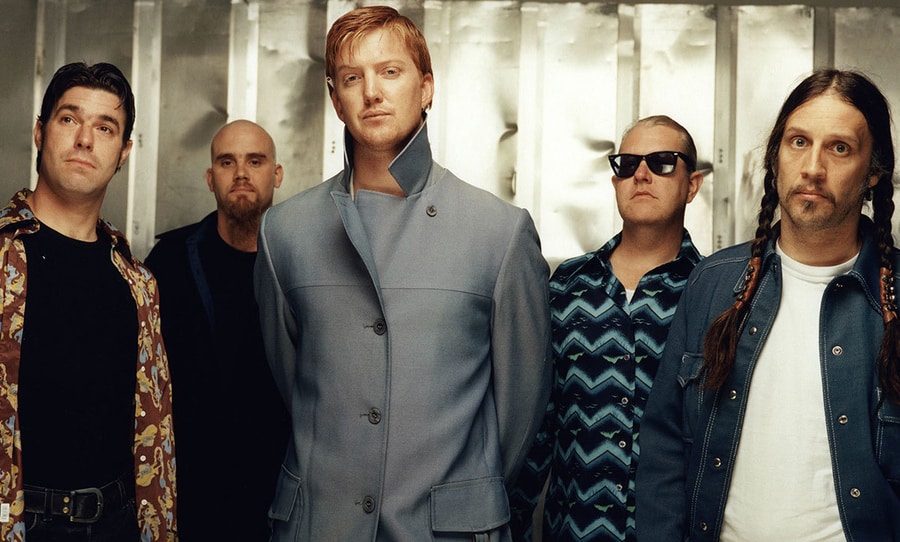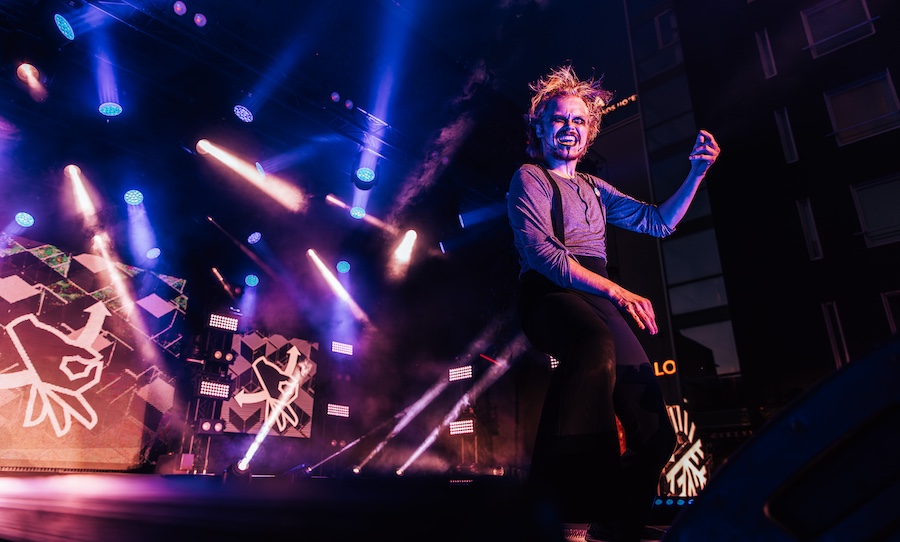For an album released all the way back in 2000, Rated R by Queens of the Stone Age still sounds undeniably punchy, aggressive and fresh—no small feat for a hard rock album. Its success in this regard is likely due to QOTSA’s eccentric songwriting, arrangement and production choices.
But what was even stranger about Rated R was the way Josh Homme and co. married their brand of what was being dubbed stoner rock at the time with meticulous precision. The band had an intense desire to trim all the fat that could have made the album excessively slow and overbearing, and instead took cues from the menacing pace of proto-punk groups like Iggy and the Stooges and The Kinks.
Let’s dive into the making of Rated R and examine the DNA of this classic album.
Queens of the Stone’s Rated R is now 20 years old. We dive into what makes it such a classic, weird and fun album to come from hard rock.
An eclectic group
As Josh Homme told The Fade in 2001, QOTSA “wanted to do a record that had a lot of dynamic range“.
Part of achieving that mission was to set up the band with a range of songwriters and singers. Homme had already made a name for himself throughout the 90s in Kyuss, a scene-defining stoner rock band, and later as the guitarist in Screaming Trees.
As such, when it came time to form QOTSA, Homme had a list of names to call upon to form the band. QOTSA’s first show featured Mike Johnson of Dinosaur Jr. on bass. Their debut EP featured Matt Cameron of Soundgarden and Pearl Jam.
The personnel on Rated R were a revolving crew of seventeen different musicians, who often contributed whole songs and vocal performances. Dave Catching from Homme’s side projects like the Desert Sessions and The Eagles of Death Metal wrote Rated R‘s 9th track, the instrumental Lightning Song, while Mark Lanegan contributed to Auto Pilot and In the Fade, as well as singing lead vocals on both. Mario Lalli also gets a songwriting credit on Monsters in the Parasol.
One of the hidden weapons of the line-up was bassist Nick Oliveri, who contributes lead vocals on three Rated R tracks. This includes the blistering Quick and to the Pointless, which is actually a placeholder vocal take that the band liked so much they kept it in. Oliveri’s performance is on the latter song is wild and extreme and even features a few lines in Dutch!
Oliveri is also responsible for the title and the cover art of Rated R, which was originally going to be titled Queens of the Stone Age II. Oliveri quite cleverly decided to bypass the parental advisory label which the album would have needed and suggested simply naming the album after the film grading system. The cover features the words “RESTRICTED TO EVERYONE, EVERYWHERE, ALL THE TIME“.
An eclectic style
There are also two drummers on Rated R in Nick Lucero and Gene Trautmann. Their alternating performances give the album another level of diversity and also lead to a lot of the colourful auxiliary percussion parts throughout, like the vibraphone on The Lost Art of Keeping a Secret, the unique tambourine pattern on Leg of Lamb, or the bongos on Better Living Through Chemistry.
What makes the album sound so modern and stand out from the deluge of hard and alternative rock bands from the turn of the millennium are the colourful, experimental, and often times quite weird choices the band made in songwriting, arrangement, and production.
While the album has more than its fair share of distorted guitars, the approach of the mixing is rarely to completely envelop the listener in sludge. On the verses of The Lost Art of Keeping a Secret the vibraphone is far louder than Homme’s chugging guitar, and when the guitars kick into gear in the choruses Homme opts for a light falsetto rather than anything resembling a scream.
When the band does really rock out on Quick and to the Pointless and Tension Head, QOTSA’s guest vocalists usually go up to 11 so much that it comes across almost as parody or self-deprecation—which is a welcome effect that’s in keeping with the playfulness of the rest of the album.
Precision and reduction
Speaking with Matt Sweeney for Noisey’s Guitar Moves, Homme stated that he originally learnt to play the guitar from a polka teacher, which he finds to influence his playing style. He believes his style is more about the right hand than the left and believes everything unique about his style occurs when he reduces what he plays.
“Basically most of my playing is about taking something away“, he says, and that he sees the point of guitar solos as “a really articulate way to make fun of guitar solos“. On Rated R, this translates into an aggressive but playful way of pushing the boundaries of how minimal great guitar parts can be.
At around 2:45 on Monsters in the Parasol, Homme’s guitar lead stays on a single note, playing short, staccato quavers throughout the four-bar phrase, and it’s done so confidently that it produces more tension than any other part could—”is he allowed to do that?” you have to ask, though you’re immediately convinced.
Similarly, on Auto Pilot, a fuzzed-out lead guitar holds a tortured bend for what seems like just a millisecond too long, but Homme has so carefully chosen his choices and articulates the note with such conviction that it feels entirely satisfying.
In general, the approach on Rated R is to push what’s acceptable and normal in rock music right to the threshold. They choose very precisely how the band will step over that line, and by how much.
20 years on
The result of the approach on Rated R is a wildly inventive album that’s characterised as much by experimentation and perversity as it is by being sharp and straight to the point. That is a hard feat in a genre that’s often characterised by self-importance and even pomposity.
To be sure, Rated R does also dip its toes in the tradition of rock and roll excess from time to time. Most of the songs are about drugs, good trips and bad trips. The only lyrics on the album’s opener are a laundry list of drugs from valium to cocaine.
If that kind of thing puts you off, fair game, but it needs to be said that the voice of Rated R is entirely self-effacing and not proud. The singers in the band are self-deprecating; Quick and to the Pointless starts with Oliveri saying “I don’t even know what I’m doing here“, which is followed by a group of kids chanting “Yeah yeah yeah!“.
Rated R was also seen as genuinely threatening at the time. Outlets like Walmart refused to stock the album, and The Guardian wrote of Rated R as having “the menace of Iggy Pop in his prime“.
Still, what makes the album so enduring is the way it played with something so potentially self-serious and grandiose like hard rock, and instead made it humorous and playful. Is it, as Pitchfork suggests, “one of the last great modern hard rock records“? Possibly, but we can also be sure that it’s definitely one of the most fun.


